News
STA, 8 October 2019 - Slovenia has earned a new reproof for the slow uptake of EU funds as the country's member of the European Court of Auditors reported that by the end of 2018 the country had only used 24.2% of the funding available for the period between 2014 and 2020.
Presenting the annual report for 2018 in Brussels, Samo Jereb said that the uptake rate was rather low the fifth year into the current financial framework, in particular compared to the fifth year of the previous framework when the rate was 37%.
While Slovenia is one of the least problematic countries when it comes to correctness of budget implementation, it is one of the poorest performing member countries in terms of the use of the available funding.
Slovenia is also one the countries with the biggest difference in the uptake rates in 2018 and 2011, which Jereb says is partly owing to that fact that in 2014 and 2015 Slovenia was focused on drawing funds from the previous financial framework, hence a delay in the uptake of current funds.
Part of the delay may be attributed to the late adoption of the legal basis at the EU level as well as to the fact that the current financial framework is more demanding than the previous one so countries have more problems adjusting their programmes to the new rules.
Slovenia's uptake rate, at 24.2% for 2018, is below the EU average of 27.3%, after being above the EU average of 33.4% in 2011, at 37%. Last year Slovenia was the fifth worst performing country, and it is the sixth this year, having come ahead of Slovakia.
According to the table released by the court, the lowest proportions of the available EU funding have been taken up by Croatia, Malta, Italy and Spain, while Finland comes first having used up more than half of the funding available in the current perspective.
Jereb explained that the European Commission had demanded EUR 8 billion worth of advance funds back from the member countries that failed to use the planned volume of available funding. The payments were then relocated to the member countries that implemented more than planned investments between July 2016 and June 2017.
Jereb would not go into details because the Commission's decisions are confidential, but he did say that the countries that benefited from the redistribution of funds were those with low uptake rates.
Slovenia got the final stamp of approval for EUR 73 million from three cohesion and structural funds in 2018 - the Cohesion Fund, European Regional Development Fund and the European Social Fund - related to investment implemented between July 2016 and June 2017. Last year the sum was zero.
Slovenia is also the only EU country that had not yet put in place in 2018 a system of indicators to monitor the effectiveness of implementation of EU-funded programmes, but only did so this year, Jereb noted.
Responding to the report, the Government Development and Cohesion Policy Office said that the 24% mentioned by Jereb included only the final phase of EU funds uptake - the payouts from the EU to the state budget.
The figure leaves out the first two phases, which see Slovenia well on its way to draw the entirety of the funds available to it, according to the office.
EUR 3.068 billion is available to Slovenia in 2014-2020 and can be drawn until 2023. Between January 2014 and August 2019 EUR 2.52 billion in EU funds has been allocated to various projects, which accounts for 82% of all funds available.
Meanwhile, EUR 2.02 billion worth of projects, representing 66% of funds, have been carried out by the end of August, while EUR 851 million has been paid out by the state budget, which accounts for 28%.
By the end of September, Slovenia forwarded to Brussels EUR 812 million worth of claims, or 26.4% of funds available, the government office said.
STA, 8 October 2019 - Adria Airways, a German-owned Slovenian airline in receivership since last week, ended 2018 with a net loss of EUR 18.6 million, up from EUR 5.4 million in 2017, shows the audited financial statement, which was released on Monday.
The air carrier's operating loss amounted to over EUR 16 million, up from EUR 3.3 million in 2017, with its negative working capital standing at EUR 14.2 million.
The airline's revenue, on the other hand, increased by 12.5% to EUR 179 million, of which the revenue from passengers rose by 1.5% to EUR 149 million.
By leasing its planes and flight crews to other airlines, Adria generated more than EUR 17 million in 2018, says the business report, which official receiver Janez Pustatičnik posted on the website of the AJPES agency yesterday.
The company attributed the loss to growing fuel prices (EUR 7.7 million) and to the cost of hiring planes with flight crews (EUR 5.5 million).
And while Adria carried 1.23 million passengers in 2018, up 1.5%, its occupancy seat rate dropped by 3.7 percentage points to 64%.
The financial statement also shows the company had 503 employees at the end of last year, a rise of almost 27% over the year before.
The auditor PwC gave the financial statement a qualified opinion because of Adria's manoeuvre with selling its brand in 2016 and then acquiring it back in 2018.
The auditor said Adria had actually never really lost control of its brand, so its sale was in fact presented in its books inappropriately.
The financial statement, which Adria had failed to release within the set deadline, was supposed to serve as the basis for Slovenia's Civil Aviation Agency to decide on whether the airline should keep its operating licence.
However, before the expiration of the deadline to submit it to the agency, Adria filed for receivership on 30 September, thus automatically losing the operating licence.
All our stories on Adria are here
Slovenia doesn’t have much of a coastline, just a small section between Italy and Croatia, but that doesn’t mean you can’t go scuba diving in the country. To learn more we got in touch with Matjaž Repnik, President of Diving Society Kisik - Oxygen (Društva Kisik – Oxygen), a PADI IDCs instructor and DDI instructor (for people with a disability), and part of the team behind watersports.si.
How did you get into diving?
My first step into diving start in 2010. It was simple – I just want to see bubbles underwater. Funny actually. Later after I finished my open water course diving become like an addiction. From that time I was driven to discover more and more and more. Over the last year I’ve been focusing on cave diving here in Slovenia.
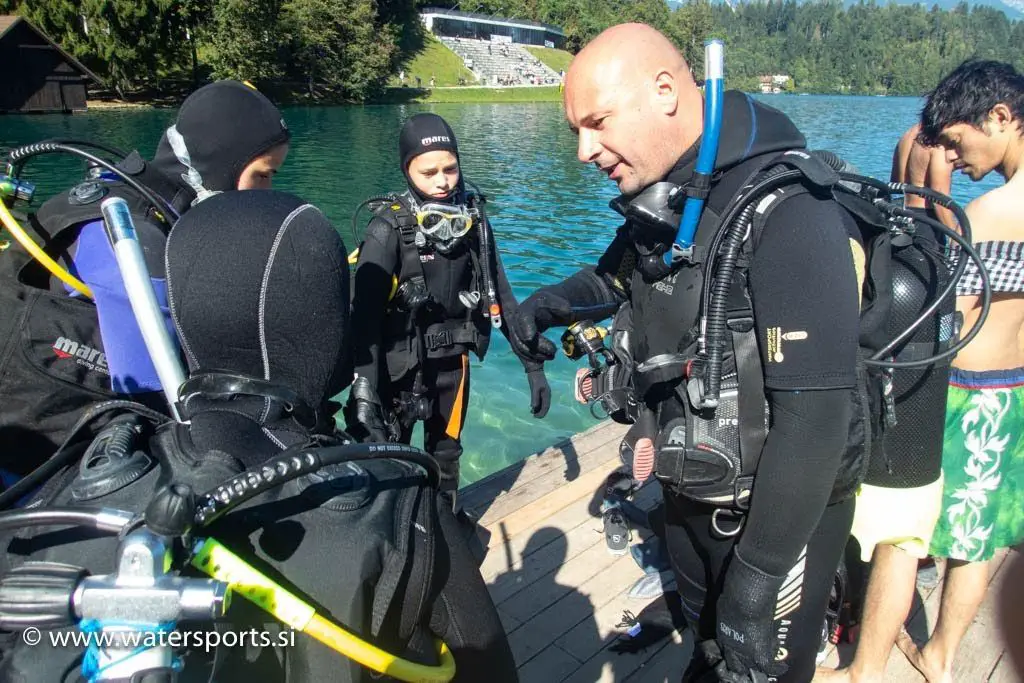
What do you offer at Bled?
At Lake Bled we can take certified divers to a few interesting places. The lake itself in summer is lovely for scuba diving, since the water is 24°C and a 5mm wet suit is all you need for one-hour dives. Until recently Lake Bled was not on the world map of diving location, but since we’ve been offering trips there it’s become more famous, and now we get people from all over.
Courses for all ages, new and experienced divers
When you’re underwater in Bled there’s lots of catfish, pike and carp swimming around you. We have special place for diving there, very hidden, and it’s only used by divers who come with us. So far no one has been disappointed, and we get a lot of positive reviews on TripAdvisor and Facebook. Night dives are also incredible there. Many small crabs are moving around, and of course big fish are much easier to see compared to diving in the day.
Some of what you can see in Lake Bled.
What if someone isn’t a certified diver?
For those we offer almost everything you need to get started. The first would be the Discover Scuba Diving program, which is actually most popular thing we offer at Bled. People visit the lake and of course they want to see what’s underwater. This program takes two to three hours, and you don’t need any previous knowledge of diving. We come with all the equipment, give a briefing, and by the end we make people wet and happy.
Get PADI certified at Lake Bled
After that many people continue to the next level, the Open Water Diver course. Once you pass this you can become a PADI Open Water Certified Diver. This is a two or three day course, and after that you can go diving all over the world to a depth of 18m with another diver, and it’s easy to do, plus all courses are conducted by very experienced instructors. We also offer many special courses, which you can learn more about by talking to us, or telling us what you want, including technical programs for the most advanced divers.
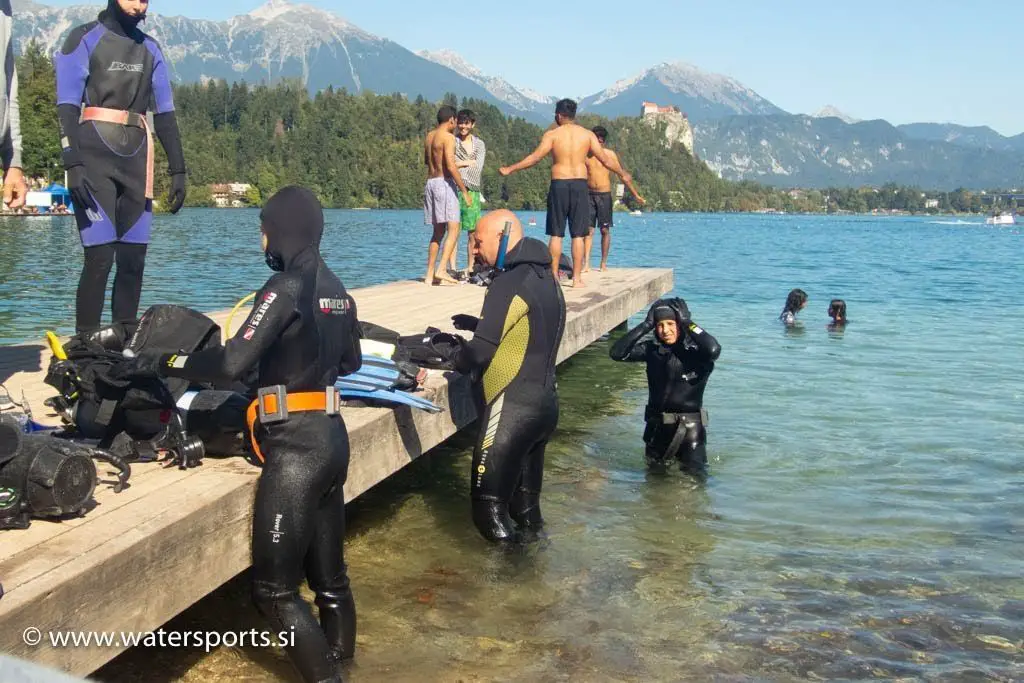
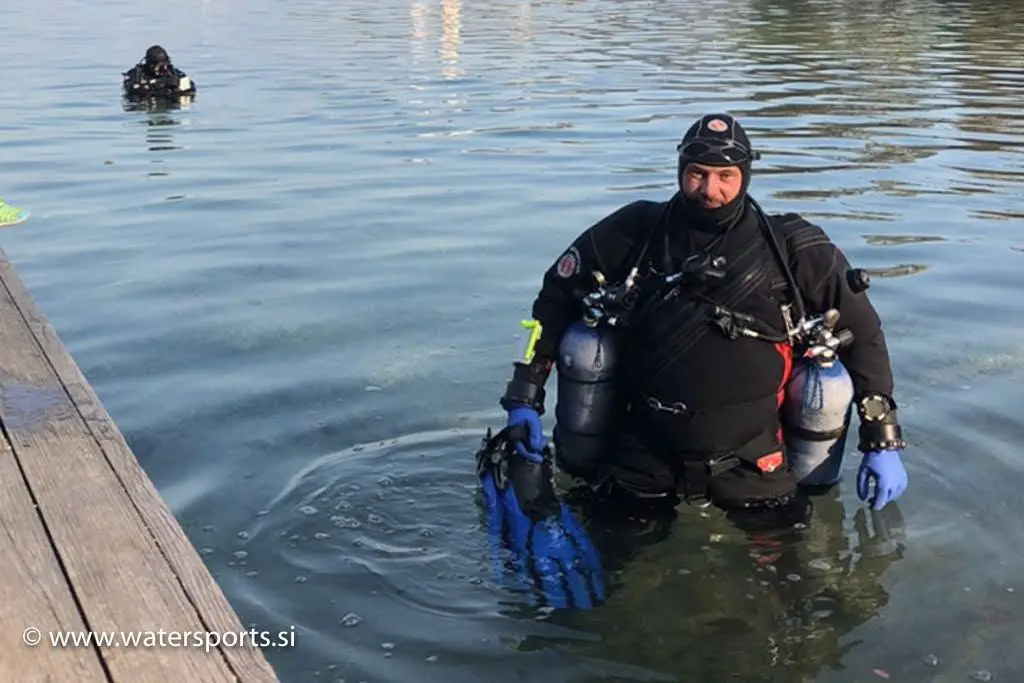
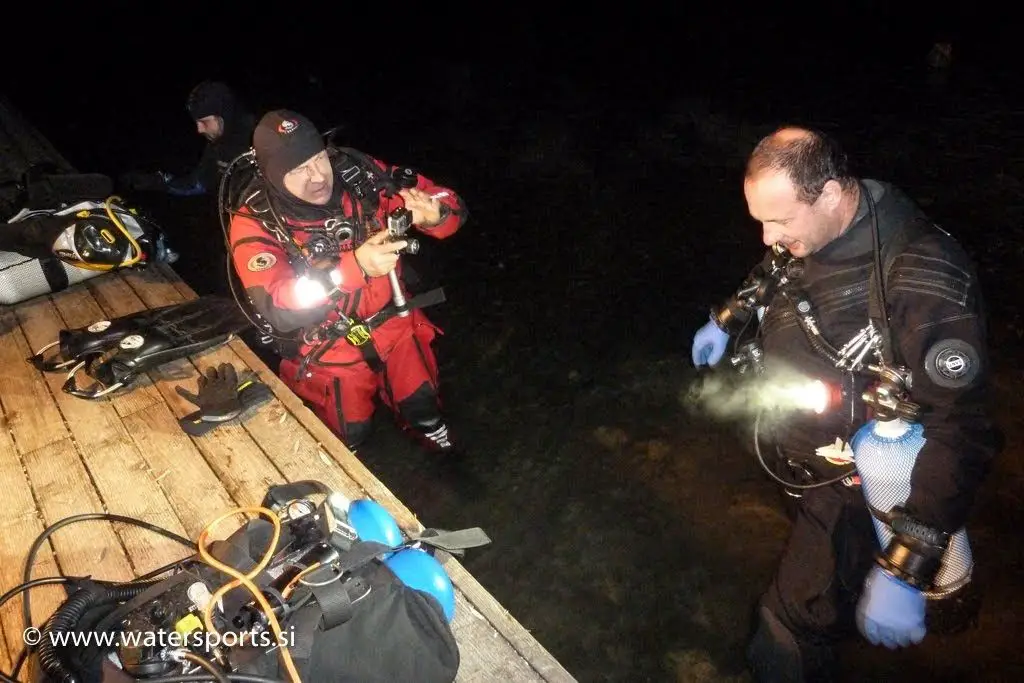
How long have you been offering this at Lake Bled?
I was first one who start commercial operations in 2012. The idea actually came up a year earlier, at the local diving club, but no one was offering something for tourists. It’s still early days at Bled for diving, but the place has a lot of potential – it just needs the local community to realize that diving can become part of the tourist offer.
What do people need to bring?
Just a smile, water, a towel and a swim suit, the rest we can provide. Of course, if someone has their own equipment and they want to use it then that’s no problem, they just need to bring it.
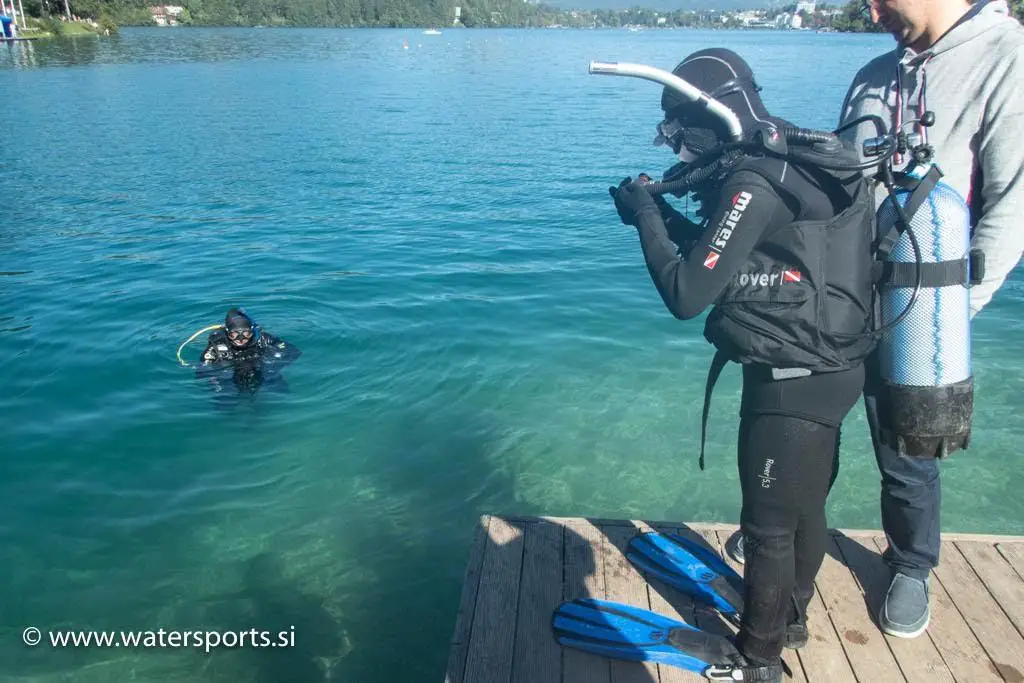
What else can people do on the water at Bled?
Well, I should say that we don’t support fishing there, since there it kills too many fish, even catch and release. Sorry, in my opinion fish are nice to see, not to hunt. Swimming is possible all around the lake, and there are public beaches. You can also rent a boat or just take a ride on a pletna, the traditional Bled boat. Many people also explore the world underwater with a simple mask, snorkel and fins, but away from the shore you should always have a support boat.
Diving part of Bled's growing tourist offer
How has Bled changed since you’ve been working there?
A lot, and the roads, especially in August, just can’t handle the traffic. Every year there are more tourists, and although that doesn’t disturb me it’s not so good for the people who live there. One problem, one of many, with mass tourism at Bled is it affects the water quality, as more people swimming there means more pollution, more suncream in the lake and so on, and this year there’s been a problem with green algae. There is an idea to try and develop a higher quality of tourism at Bled, not just mass tourism, but for that the area needs to offer more, and that’s something that diving can be a part of.
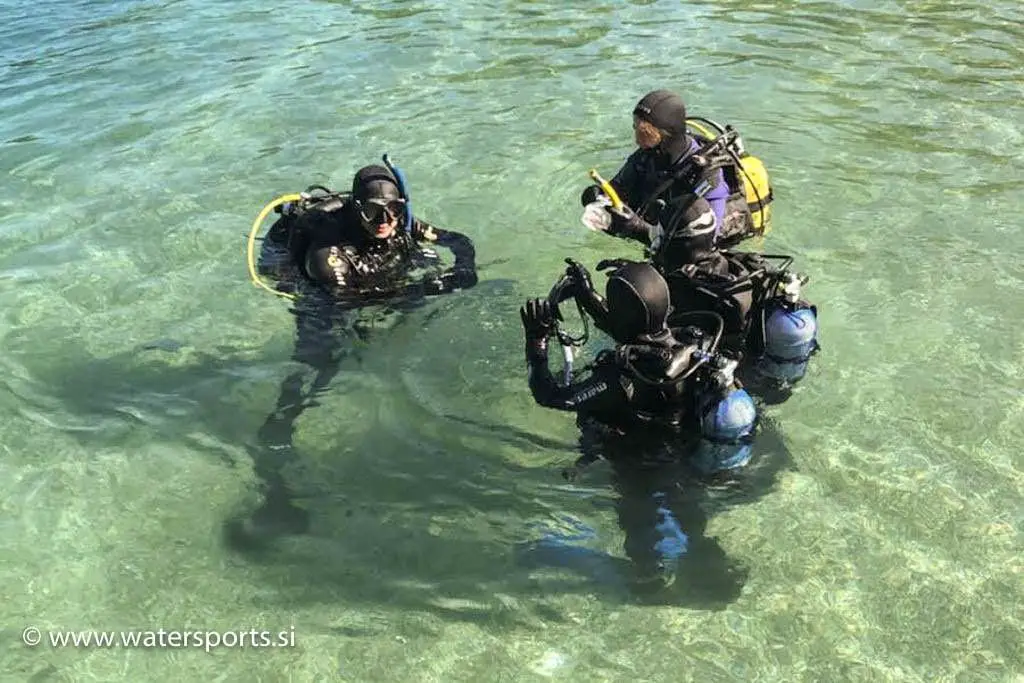
When is the diving season?
Business usually starts in June, and the busiest time is in August, when sometimes we just can’t serve all the people we’d like to. The traffic can be terrible then, if you come by car and not by train, so the best time to come is in the morning, for an 8am dive. For me the best time to visit for diving is in September, there are fewer people and the water is warm. People also come in the winter, when we do some dry suit specialty, TEC courses, and if there’s ice then we do ice diving and courses.
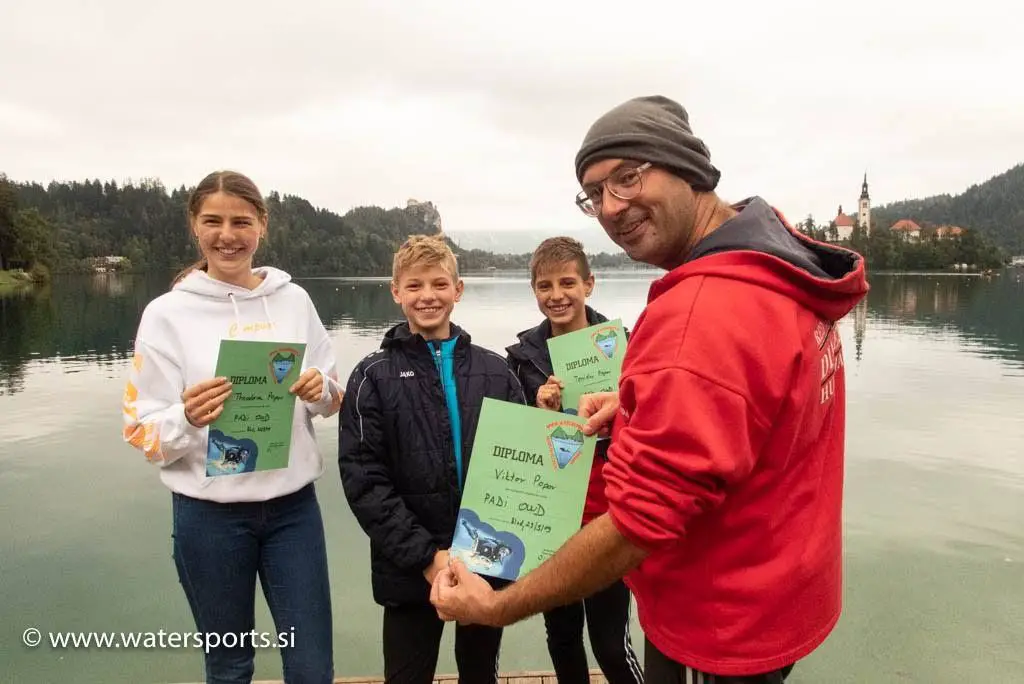
What other places do you dive?
Besides Bled we offer also diving nearby Lake Bohinj. There’s one unique and very beautiful diving place for advanced divers, in it’s a green area with lots of water and a slight current. We love it., although the lake itself is nothing special for diving, so we don’t do diving in there.
You can learn more about diving with Matjaž Repnik and his team at www.watersports.si/en, or by email at This email address is being protected from spambots. You need JavaScript enabled to view it., and with any luck we’ll get back to him soon to find out about diving in Slovenia’s caves.
After last week’s IFSC World Cup in Kranj, sport climbing moved to Edinburgh for the European Championships in Lead and Speed categories. After IFSC World Cups, these are one of the most important competitions in sport climbing, and fans were eager to see who could get the medals.
All Slovene eyes were set on Lučka Rakovec after her first bronze medal seven days prior to this event, and she did not disappoint. She safely made it to the semi-finals in 4th position and was ready to fight in Sunday’s afternoon final round. Young climber Luce Douady, the first one out at the final, set a really high point – hold 43 – but it was Lučka who broke it some minutes later after achieving an impressive 46+. After her performance it was clear that the route for the final, although it wasn’t extremely hard on a technical level, required plenty of endurance and a quick climbing style to make it to the top, which at the end became the key factor to separate the athletes. No other climber could make it higher than new Slovene rising star, and Lučka claimed her first gold medal in a senior competition.
Tjaša Kalan was the second Slovene woman to compete in the finals, and although she looked strong on the first part of the route she got stuck after hold 19 and lost a lot of valuable time trying to get over this obstacle. She managed to move on, however, but was already pumped after her fight and fell shortly after on hold 22+.
Legend Mina Markovič (she has won 21 IFSC World Cups) also made it to the finals. Her climbing style was secure through all the route, but when she made it to the final section of the wall she couldn’t find a good combination of moves to get to the top, and fell just one hold before the medal positions.
After Lučka, the podium was completed by Laura Rogora in second place and Luce Douady in third position. Since all of them are 18 years old or younger, we can safely say that sport climbing has an exciting future in the upcoming years.
As for the men, Martin Bergant qualified in 8th position in the semi-finals and successfully made it to his first Senior Lead Final. On this stage, he set the first high point of the competition (hold 34+) and remained at the top of the ranking until Alberto Ginés López, from Spain, jumped on the wall and fell after hold 38+. Martin was really close to the bronze medal, and although both him and Sascha Lehmann reached the same hold before falling. Sascha had more time left on the clock, which meant that he was awarded with 3rd place while Martin finished 4th. Nevertheless, this is not a bad result at all for the 23-year-old climber from Škofija Loka, who will surely deliver more good performances in the near future.
Luka Potocar also qualified for his First Senior Lead Final after an impressive performance in the semi-finals. However, when it was his turn to climb, he made a route reading mistake and went on the wrong path on the wall, and unfortunately he fell really early on.
No other surprises happened, and Adam Ondra successfully achieved the high point on the route at hold 45+, winning once again a Lead event and proving, for those of who still doubted it, that he can definitely qualify for the 2020 Olympics in next month’s event in Toulouse.
Janja Garnbret did not attend this event.
All our stories on sport climbing are here
STA, 7 October 2019 - Former Health Minister Tomaž Gantar stepped down as vice-president of the coalition Pensioners' Party (DeSUS) in September. In today's statement for the STA, Gantar was critical of the way Karl Erjavec is leading the party, saying his leadership style was less and less democratic.
Gantar, who has been a prominent member of DeSUS for years, is returning to his medical profession.
The former health minister said he was unhappy with the party's work recently. He said vice presidents did not have clearly defined roles and subsequently had no significant influence on the work of the party.
He will, however, remain a member of the party.
Erjavec would not comment on Gantar's resignation or his statements about party leadership today.
Meanwhile, DeSUS deputy group head Franc Jurša said that everyone was entitled to make assessments about anybody's work. "I would not assess Erjavec at this point," he said.
Juša also said that he did not sense any friction among top party officials but that messages did come on a daily basis from the field. Many think the party should do more, he added.
DeSUS, which has been on a downward trajectory for some time, will hold an extraordinary election congress on 17 January.
The party won only five seats in the National Assembly in 2018 and failed to secure a single MEP post in the May EU election.
Erjavec offered his resignation already after the general election, but the party council rejected it. After the EU election, however, the party decided it was time for an election congress.
The long-serving party head and current Defence Minister Erjavec announced he would run for another term. So far, no other candidates have announced their bids.
Asked whether it would be good if Erjavec had a rival at the congress, Jurša did not give a straightforward answer. He said that multiple candidates made election more interesting from the democratic point of view.
"But being a party president is not a rewarding job and I don't know if any of those who would be capable of running the party will decide for it."
Gantar said today he would not run for any posts at the congress.
Check the date at the top of the page, and you can find all the "morning headlines" stories here. You can also follow us on Facebook and get all the news in your feed.
A schedule of all the main events involving Slovenia this week can be found here
This summary is provided by the STA:
PM, FinMin say 2020, 2021 budgets with surplus despite slowdown
LJUBLJANA - Prime Minister Marjan Šarec and Finance Minister Andrej Bertoncelj presented the 2020 and 2021 draft budgets in parliament, noting that, despite the expected slowdown of economic growth, the budgets would see a surplus, and that more money would be available than earlier. Healthcare, science, economy and security are priorities. The budgets feature the highest expenditure to date: for 2020 it is set at EUR 10.35 billion and for 2021 at EUR 10.45 billion. A government budget surplus of roughly 1% of GDP is planned for both years. The National Assembly is expected to vote on both budgets at the end of November.
Adria Airways staff start getting termination notices
BRNIK - The official receiver of Adria Airways started serving notices of job termination to the airline's employees, while pilots and cabin staff are reported to be interviewed with potential new employers. Citing unofficial sources, the newspaper Finance reports that the Polish flag carrier LOT has conducted job interviews with Adria pilots, while cabin staff have received offers for jobs from Wizz Air, the Hungarian low-cost carrier. Receivership was started at Adria last week the request of the management of the German-owned carrier due to insolvency after the government declined its calls for aid. Unofficially, the company ran up EUR 90 million in debt.
BAMC inquiry hears first witnesses
LJUBLJANA - The parliamentary inquiry into the operations the Bank Asset Management Company (BAMC) kicked off its work today, quizzing several key persons in charge of critical developments in 2013, when the country's bad bank was incorporated. Appointed in March, the commission started with questions about the transfers of bad claims to BAMC. The first witness was former Finance Ministry state secretary Mitja Mavko, who went on to serve as a non-executive director at BAMC between January 2014 and March 2015, with the hearing revolving around what seems to be a contentious selection of the auditor.
Quality employment in focus of World Day for Decent Work
LJUBLJANA - Slovenian trade unions urge employers to provide for decent work and reflect on the workers' contribution to economic growth and prosperity as the World Day for Decent Work is observed around the globe. The ZSSS confederation also highlights the increasingly blurred line between work and spare time, especially when digital technologies enable employers to reach workers at any time. The ZSSS thus promotes a good work-life balance, repeating its demand for eight hours of work, eight hours of spare time and eight hours of rest. In a statement issued on the occasion, the Movement for Decent Work and Welfare State highlighted young workers in precarious jobs, who earn less than half of their colleagues working on permanent contracts.
Employer club puzzled by opposition to proposed tax tweaks
LJUBLJANA - An association of employers has expressed surprise with the opposition to the latest proposed tax changes in part of the public, saying that some stakeholders apparently did not want to support changes which would bring higher net wages for employees. The Slovenian Business Club said that as "wages in Slovenia are among the most taxed in the EU", it is unbelievable to see opposition to the changes bringing increased general tax credit and changes to the income tax brackets. In the six years of economic growth, politicians have provided for significantly higher net wages to all social groups, while providing employees in the real sector only with very modest tax changes a few years ago, it added.
DeSUS vice-president Gantar steps down, criticises Erjavec
LJUBLJANA - Former Health Minister Tomaž Gantar stepped down as vice-president of the coalition Pensioners' Party (DeSUS) in September. In today's statement for the STA, Gantar was critical of the way Karl Erjavec is leading the party, saying his leadership style was less and less democratic. Gantar, who has been a prominent member of DeSUS for years, is returning to his medical profession. DeSUS, which has been on a downward trajectory for some time, will hold an extraordinary election congress in January. Gantar, who remains a member of the party, will not run for any post at the congress.
NGO wants Slovenia to serve as role model for whistleblower protection
LJUBLJANA - Transparency International (TI) Slovenia called on the government on Monday to implement a directive on whistleblower protection, confirmed today by EU countries, by adopting an ambitious law which would position Slovenia at the front line of such protection efforts worldwide. The NGO urged the government to ensure that the new law would fully protect whistleblowers when they report any alleged illegal activities or risks to the public interest as well as to consider setting up an institution which would be in charge of enforcing such legislation.
Neda Rusjan Bric wins Mira award for women authors
LJUBLJANA - The women's section of Slovenian PEN has honoured Neda Rusjan Bric with this year's Mira Prize, an award it introduced in 2013 to honour outstanding women authors. An actress by profession, Rusjan Bric, 57, is an author who has directed a number of multimedia productions on the basis of her own texts. The jury said that in her theatrical pieces or films, she revives less known or overlooked figures and social phenomena from her Primorska region, making them part of national herit. She received the accolade at a ceremony at Cankarjkev Dom in Ljubljana, which was also dedicated to writer Luiza Pesjak (1828-1898).
Slovenian boxer wins five world titles
LJUBLJANA- Slovenian boxer Ema Kozin won five world titles on Sunday, having out-boxed Swedish Maria Lindberg at Stožice Arena in Ljubljana and defended her World Boxing Federation (WBF) Women's World Champion title of the Super Middleweight class. The 20-year-old, nicknamed The Princess, won five world champion titles yesterday - apart from the WBF one, also the titles of the Women's International Boxing Federation, the Women's International Boxing Association, the Global Boxing Union and the International Boxing Association in the Super Middleweight division.
Visiting Ljubljana? Check out what's on this week, while all our stories on Slovenia, from newest to oldest, are here
If you're learning Slovenian then you can find all our dual texts here
STA, 7 October 2019 The official receiver of Adria Airways started serving notices of job termination to the airline's employees on Monday while pilots and cabin staff are reported to be interviewed with potential new employers.
The official receiver, Janez Pustatičnik told the STA on Monday that he started serving notices today, but he could not say when all of the 558 airline's employees would receive them.
Some of the staff are currently abroad, these will get termination notices by post, said Pustatičnik, who held first meetings with the employees on Wednesday, as the Kranj District Court ordered receivership for the company.
Those of the redundant workers who would like to claim unemployment benefit, need to register with the Employment Service and ask for the benefit within 30 days.
Those who register within three days after the expiry of the notice period, will be eligible for an allowance equalling 80% of the average of their salaries and the others to 60% of the average.
The receiver expects to be able to assess the scope and the duration of the receivership procedure by the time he compiles an opening report when the amount of registered claims, the size of the bankruptcy estate and a detailed state of the company's finances are clear.
The receivership was started at the request of the management of the German-owned carrier due to insolvency after the government declined its calls for aid. Unofficially, the company ran up EUR 90 million in debt.
Citing unofficial sources, the newspaper Finance reports that the Polish flag carrier LOT has conducted job interviews with Adria pilots, while cabin staff have received offers for jobs from Wizz Air, the Hungarian low-cost carrier.
According to Finance, LOT is looking for at least ten pilots for smaller aircraft, which suits Adria pilots well-being that they are licensed to fly Canadair aircraft, now rarely used planes worldwide.
Some of Adria Airways' major links have been taken over by foreign airlines, while the government has proposed legislative amendments that would make it possible to subsidise commercially unpopular links.
Speculation is also rife about potential incorporation of a new air carrier. Some media have been reporting that a foreign airline might step in and employ at least part of Adria staff.
All our stories on Adria are here
STA, 7 October 2019 - Slovenian boxer Ema Kozin won five world titles on Sunday, having out-boxed Swedish Maria Lindberg at Stožice Arena in Ljubljana and defended her World Boxing Federation (WBF) Women's World Champion title of the Super Middleweight class in what was a successful night for other Slovenian fighters as well.
The 20-year-old boxer, nicknamed The Princess, won five world champion titles yesterday - apart from the WBF one, also the titles of the Women's International Boxing Federation, the Women's International Boxing Association, the Global Boxing Union and the International Boxing Association in the Super Middleweight division.
Po sinočnjem dvoboju s Švedinjo v Stožicah #EmaKozin komaj drži vse pasove za naslov svetovne prvakinje.. Boj je bil težak, a se je izšlo! Bravo Ema! pic.twitter.com/pMp9G3mdNz
— FlashScore.si (@FlashScoreSI) October 7, 2019
Kozin won a hard fought unanimous decision in front of a raucous home crowd, with Lindberg showing a disappointment with the judges' decision at the side of the ring after a close fight.
"You need two people for a good fight. I understand the Swedish fighter was disappointed since the fight was really close, but I do think I was better," said Kozin after the win.
The best Slovenian male boxer Dejan Zavec was also in the audience, supporting Kozin on her way to the five titles.
Kozin won the WBF World Super Middleweight crown last March. She is famous for being a hard-punching and technically gifted southpaw.
Yesterday's CFC 5 fight night featured twelve fights, including Slovenian boxer Andrej Baković in the super welterweight weight class and Monika Kučinić in the K1 division.
The former out-boxed Serbian fighter Martin Bošković and is on an unbeaten run, securing 10 wins out of 10 professional matches, while the latter beat Italy's Irene Roggio, who threw in the towel already in the first round.
Another Slovenia's win was secured by Bojan Kosnedar, nicknamed The Turtle, who won the Cage Fight Championship (CFC) title in a Mixed Martial Arts fight with Slavoljub Mitić from Serbia.
STA, 6 October 2019 - Retired Celje Bishop Stanislav Lipovšek stressed at the annual Teharje ceremony remembering an estimated 5,000 victims of war and post-war summary executions the need "for true reconciliation with the past" if Slovenia wants to build a safe and happy future.
Addressing the ceremony in the Teharje Memorial Park (Spominski park Teharje) near Celje on Sunday, Lipovšek said 74 years were passing this year since the end of World War 2, 50 of which passed in forced silence and an guided concealing of the truth about events during and following the war.
While speaking of 600 execution sites around the country as proof of that, Lipovšek expressed gratitude to all who made sure that these sites are finally being tended to and that Slovenia is approaching the basic civilisational norm of giving the dead the right to a name and a grave and the living the right to remember.
Mass Graves in Slovenia: An interactive map
"For a lasting an true peace and a future of our nation, a reconciliation of with the past is vital, since we cannot build a safe and happy present time and future without making sure true reconciliation with the past occurs.
"Reconciliation is only possible if we're willing to forgive. And forgiveness is only possible when we're ready to admit the truth, no matter how painful, difficult and burdensome it may be. Only the truth sets you free," Lipovšek said.
The ceremony was also addressed by researcher Slavko Žižek, who said "no nation can survive with a burden that began with the murder of several hundred victims in the autumn of 1941 and spring of 1942 and ended with the executions of thousands at the end of the war".
He rejected the continuing accusations of treason, collaboration etc, saying that the "only sin of these people was to resist the terror of the red star".
Many had to leave Slovenia because of their "love of God, of the nation, homeland and life" and they managed to preserve the Slovenian language and love of the homeland and transfer them to their offspring, which "simply does not square with the definition of treason", he said.
Among the victims the Teharje Memorial Park pays respects to were members of the Home Guard, a militia that collaborated with the Nazis; soldiers; civilians; and refugees from Croatia and Serbia apprehended by the Allies in May 1945 in the northern Koroško region as they were fleeing north.
Book: Post-War Massacres in Slovenia
The Allies turned them over to the Partisans, who brought them to the Teharje barracks, a facility formerly used by the Nazi Germany military.
In the subsequent two months, some 5,000 people were killed without a trial on several locations nearby Teharje, including the notorious Huda Jama mine shaft near Laško.
It took a long time until the locals dared to speak about what had happened. Many mustered the courage to speak up only after Slovenia gained independence in the early 1990s.
A memorial park was inaugurated at the site of the former barracks in 2004 but it still not fully finished.
STA, 4 October 2019 - Slovenian and Swedish researchers have developed a new concept for aluminium batteries, doubling their energy density and at the same time reducing the cost to the environment by using readily available and less damaging materials than those used at the moment.
Aluminium batteries have a number of advantages over the currently used lithium-ion batteries, among them high capacity of the aluminium metal anode, as well as tried and tested production and recycling methods.
The newly developed concept could lead to a significant reduction in battery prices and lower the battery's impact on the environment, the Chemical Institute announced the news in a press release
Lower production cost and impact on the environment "make our system incredibly interesting for energy saving in large-scale photovoltaic or wind turbine plants," according to Patrik Johansson of the Chalmers University of Technology in Gothenburg, Sweden.
Johansson and Robert Dominko of the Ljubljana Chemical Institute led two research teams that developed the new concept presented in late September in an article in the Energy Storage Materials journal.
Explaining the revolutionary concept, the article says that previous designs for aluminium batteries have used the aluminium anodes and graphite cathodes.
However, graphite provides too low an energy content to create battery cells with enough performance for everyday use. Now, graphite has been replaced by an organic, nanostructured cathode, made of the carbon-based molecule anthraquinone.
The anthraquinone cathode has been developed by one of article co-authors, Jan Bitenc of the Ljubljana Institute of Chemistry, while he was guest researcher at Chalmers.
According to Niklas Lindal, another co-author, the team is now working on eliminating chlorine from the electrolyte.
The researchers believe that although aluminium storage technology is a long way from commercial production, the new device will be able to compete or complement lithium-ion storage.
"So far, aluminium batteries are only half as energy dense as lithium-ion batteries but our long-term goal is to achieve the same energy density."
More details on this research can be found here
STA, 4 October 2019 - An officer of the Koper Police Department who was, according to unofficial reports by the newspaper Dnevnik, the head of the district's narcotics task force, has been arrested on charges of drug trafficking. He was sacked and banned from possessing his duty weapon at the end of September and is currently in house arrest.
The officer, arrested on charges of illegal drug production and trade, was put in preventive detention on Sunday evening. Upon appealing against the custody decision, he was put under house arrest today and will remain under it until further developments, his lawyer Monika Mavsar told the STA.
The Koper Police Department said on Monday that the accused was arrested as a result of a covert investigation based on the suspicion of a criminal offence of illegal drug production and trade, including banned substances in sport and ingredients used for producing illegal drugs.
The suspect has been banned from carrying out officer duties during the prosecution case and has been blocked from accessing confidential police data.
Mavsar has told the newspaper Primorske Novice that the confiscated cannabis was not the defendant's and was not meant to be used for trafficking but was meant to ease the defendant's father's medical issues. The father has been put under house arrest as well.
According to Dnevnik, the suspected officer could face up to ten years in prison.




